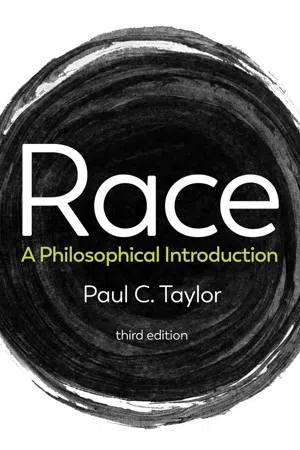
- English
- ePUB (mobile friendly)
- Available on iOS & Android
About this book
The third edition of Race: A Philosophical Introduction continues to provide the definitive guide to a topic of major contemporary importance. In this thoroughly updated and revised volume, Paul Taylor outlines the main features and implications of race-thinking, while engaging the ideas of important figures such as Linda Alcoff, K. Anthony Appiah, W. E. B. Du Bois, Michel Foucault and Sally Haslanger. The result is a comprehensive but accessible introduction to philosophical race theory and to a non-biological and situational notion of race, which blends metaphysics and social epistemology, aesthetics, analytic philosophy and pragmatic philosophy of experience.
Taylor approaches the key questions in philosophy of race: What is race-thinking? Don't we know better than to talk about race now? Are there any races? What is it like to have a racial identity? And how important, ethically, is color blindness? On the way to answering these questions, he takes up topics such as mixed-race identity, white supremacy, the relationship between the race concept and other social identity categories, and the impact of race-thinking on our erotic and romantic lives.The concluding section explores the racially fraught issues of policing, immigration, and global justice, and the implications of the political upheavals of the past decade, from the election of Donald Trump to the global upsurge in anti-immigrant populism.
Updated throughout, Race remains a vital resource for the educated general reader as well as for students and scholars of ethnic studies, philosophy, sociology, and related fields.
Frequently asked questions
- Essential is ideal for learners and professionals who enjoy exploring a wide range of subjects. Access the Essential Library with 800,000+ trusted titles and best-sellers across business, personal growth, and the humanities. Includes unlimited reading time and Standard Read Aloud voice.
- Complete: Perfect for advanced learners and researchers needing full, unrestricted access. Unlock 1.4M+ books across hundreds of subjects, including academic and specialized titles. The Complete Plan also includes advanced features like Premium Read Aloud and Research Assistant.
Please note we cannot support devices running on iOS 13 and Android 7 or earlier. Learn more about using the app.
Information
Part I
Knowing and Being
1
The Language of Race
Prologue – Black Power mixup
1.1 Race-talk and the invitation to philosophy
Table of contents
- Cover
- Title Page
- Copyright
- Preface to the Third Edition
- Acknowledgments
- Introduction
- Part I Knowing and Being
- Part II Ethics and Experience
- Further Reading
- Index
- End User License Agreement